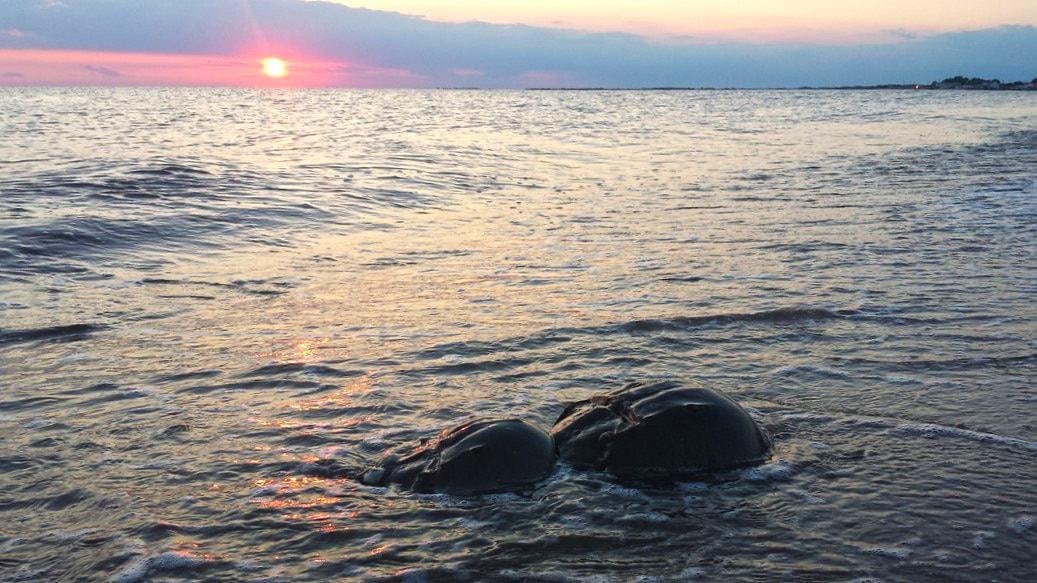|
Your efforts to help protect Delaware Bay horseshoe crabs and migratory shorebirds paid off as the Atlantic States Marine Fisheries Commission (ASMFC) recently decided not to restart the harvest of female crabs for bait. The decision came on Thursday, November 10 during the ASMFC 80th Annual Meeting, which was held in Long Branch, NJ. Members of the Horseshoe Crab Management Board cited an influential public comment process, which included more than 34,000 letters in support of the crabs and the red knots. “Acknowledging public concern about the status of the red knot population in the Delaware Bay, the board elected to implement a zero female horseshoe crab harvest for the 2023 season as a conservative measure,” the commission said in a statement. The commission will still allow a harvest limit of 475,000 male-only horseshoe crabs next year. ASMFC is a deliberative body made up of representatives from the 15 U.S. states on the Atlantic Coast. It was formed to coordinate and manage sustainable use of fishery resources — including marine (saltwater) fish, shellfish, and anadromous fish (migratory fish that ascended rivers from the sea for spawning).
For the past 10 years, ASMFC has prohibited harvesting female horseshoe crabs for bait in Delaware Bay, while allowing up to 500,000 male crabs to be taken each year. However, in 2022 the Commission began the process for implementing a new Adaptive Resource Management (ARM) plan that cwould have allowed an annual harvest of 150,000 female crabs. Beyond the bait harvest, the ASMFC has allowed the biomedical industry to catch an unpublished number of crabs each year in order to extract some of their blood, which is used to detect bacteria in medical products including vaccines. While the companies involved insist bleeding the crabs harms only a small fraction, there is mounting evidence that many die when returned to the water and others are unable to breed for years. The American Littoral Society and many other environmental organizations opposed the proposal to increase bait harvesting because it would endanger Delaware Bay horseshoe crabs and the migratory shorebirds (like the Red Knot) which depend on their eggs every spring. Red Knots are listed as threatened under the Endangered Species Act. The basis for the proposed change was a revision to computer models of horseshoe crab populations in the bay. According to the models, the number of female crabs in the bay has increased to about 9 million, and that the number of Red Knots passing through the bay on migration every spring was estimated to be stable at about 45,000. However, field observations over the past several years did not support that conclusion, according to Dr. Larry Niles, a wildlife and habitat-restoration biologist who has studied the crabs and migratory birds of Delaware Bay for years and participates in annual efforts to count birds on the bay's beaches. "The Delaware Bay stopover for Arctic nesting shorebirds remains compromised and growing worse," Niles wrote in a June post on his blog. "Although the Red Knots numbers nearly doubled from 2021 to 2022, this year's count was less than half of the 30,000 counted in 2019 and a fraction of the population in the 1990s." Moreover, the ARM change would fly in the face of the framework ASMFC has used since the 2013 fishing season, which set harvest controls that would not be lifted until the Delaware Bay region hosted at least 81,900 Red Knots or 11.2 million female horseshoe crabs. Based on the Commissions own numbers, neither of these scenarios has occurred. According to a number of experts, allowing more crabs to be taken at this point could push the Red Knot into extinction. While certainly an environmental concern, many have pointed out that taking more crabs and harming migratory shorebird populations could have significant economic consequences. The revenue equivalent for turning horseshoe crabs into bait for eels, catfish, and conch is about $100,000 annually. In contrast, a 2006 study found that eco-tourism focused on Delaware Bay's migratory shorebirds was worth $34 million a year in New Jersey's Cape May County alone. “We know Red Knot numbers are so depleted that the species is listed as threatened, so we shouldn’t take risks we can avoid,” said Tim Dillingham, Executive Director of the American Littoral Society. “Using horseshoe crabs for bait could hurt not just the environment but also the economy of the entire Delaware Bay region. It’s just not worth it.” In 2008, an effort led by the Littoral Society, working with the Audubon Society and the Delaware Riverkeeper Network, resulted in New Jersey's legislature passing a ban on taking any horseshoe crabs, with exemptions for biomedical use, including research and the development vaccines. The New Jersey moratorium remains in place, but it is the only one enacted by states bordering the bay. Environmental organizations in Delaware have launched an effort to convince the Delaware legislature to pass a crab harvest moratorium, like New Jersey's. While certainly celebrating the ASMFC decision – and the groundswell of public support that helped drive it – the Littoral Society and partners plan to continue monitoring the situation, while also exploring other avenues to protect both the crabs and birds of the Delaware Bay area.
Tommy Owens
11/18/2022 10:11:10 am
That is great news. Good work holding them to their previously established framework.
Don Riepe
11/18/2022 12:21:52 pm
Maybe we should pay the fishermen the $100,000 in total that is the estimated value of harvesting the crabs. It could be paid for by the pharmaceutical industry as mitigation for their damage to the crab population. Comments are closed.
|
Archives
July 2024
Categories
All
|


